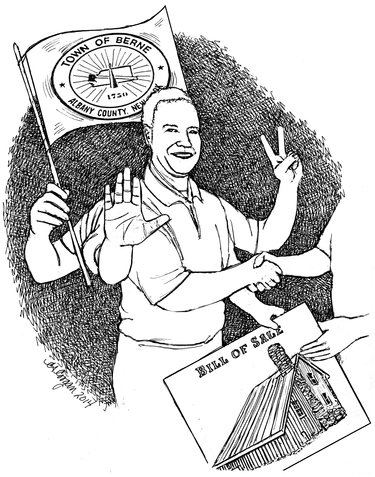Minding multiple roles is a public servant's duty
Public servants should be just what the name says — workers who serve the public.
This often involves setting aside personal interests.
And, to be trusted, public servants must avoid even the appearance of a conflict of interest.
Beyond that, they need to be open about their actions and willing to answer questions.
Although essential, none of this is easy. We hold in highest regard the elected and appointed public servants who do this well.
Part of our job as journalists is to hold public servants accountable. We’re sometimes a citizen’s last resort. We field many more complaints and inquiries than ever turn into published stories.
When a citizen contacts us with a problem, we often do research that never sees the light of day. Just by our asking, sometimes the public servant rights the situation.
Other times, the complaint turns out to have no merit.
We, as journalists, are not advocates for any particular person, cause, or group. We do not set out to “get” anyone.
Lots of times, when one of our reporters approaches a public servant with a question, the community is already rife with rumors about his or her behavior. We give that person a chance to explain himself and then we do research to see what is true. Often, by clarifying a situation, our reporting clears a person being ground up by the rumor mill.
Other times, there is merit to a complaint, which we report so that it may be righted. An essential first step to solving any problem is clearly identifying it.
We’re running a front-page story this week about a piece of land in Berne being auctioned by Albany County. Our Hilltown reporter, Marcello Iaia, found this story as he followed up on an April 17 article that raised some questions about Berne’s building inspector, Timothy Lippert.
Here’s how the story unfolded.
Donald Stamm lives out of town. He owns an old farmhouse — a saltbox built in the 1800s — on 15.5 acres. Last spring, he wanted to shore up the foundation before winter so the building could be used to store feed, salt, fencing materials, and tools. He hired Martin Tessarzik to the do the work; Tessarzik raises beef cattle in Schoharie and wanted to graze some of his animals on Stamm’s land.
Stamm told us that Lippert improperly denied his application for a building permit to do this work and, further, that Lippert recommended demolishing the building for his own gain. Stamm says he was contacted about selling the property by the office of attorney Aline Galgay and that her secretary said Scott Green wanted to buy the property to use as a hunting camp.
Scott Green and Lippert live on a beef farm on Bradt Hollow Road, less than a mile from Stamm’s property.
When we asked Berne’s supervisor, Kevin Crosier, about the allegation, he said, “We spoke to Mr. Lippert, we spoke to his better half, and that’s it, the answer is ‘No, we didn’t do that,’” he said of Lippert and Green colluding to devalue Stamm’s property in order to purchase it at a reduced price.
Both Crosier and Lippert said “Scott Green” is a common name. It appears only once in the Albany County voter rolls, at the Bradt Hollow Road address.
When our reporter asked Lippert about it, he said that Stamm was a property owner angry over his permit denial; Lippert also said that who he lives with is not our business.
It becomes our business when it affects the way a public servant does his job. If a building inspector denies a permit or orders a demolition to devalue property that someone who shares his household is trying to buy, that is a clear conflict of interest.
We reviewed the November 2013 letter in which Lippert denied the permit: He stated the structure had exceeded its life expectancy; was built without any regard to New York’s building code; and that it lacked water, electrical, and septic service. Lippert recommended “immediate demolition” as “the structure was an invitation to vandals.”
Of course the saltbox was built without regard to current code; it was constructed in the early 1800s. And, since it was to be used for storage, what need would there be for water, septic, and electricity? What right does a building inspector have to recommend the demolition of a sound structure that is of no threat to anyone?
Since our April 17 story ran, we received a reply on a Freedom of Information Law request we filed with the state’s Department of Environmental Conservation for records dealing with Stamm’s property.
The DEC gave us two letters written last May. We filed a similar request with the town of Berne and did not receive those letters; the town clerk said she gave us everything in the file. The letters say copies were sent to Crosier and Lippert.
Stamm, who had been given a May 3 Notice of Violation from the DEC on work to ready his pastures for grazing, wrote to the DEC on May 16: “The fact of Mr. Lippert’s complaint against a competing beef cattle operator is frankly disturbing in that the consequence of your stop-work order prevents Mr. Tessarzik from utilizing my property this summer as pastureland for his cattle, which is economically harmful to me as well as to Mr. Tessarzik.”
The DEC responded on May 31 that Stamm’s property had been reviewed and the Notice of Violation was rescinded since the work was for agricultural use and “no water quality violations were observed.”
What a waste of public funds — having overworked DEC staff check on unfounded charges.
Most recently, an Albany County auction for a piece of vacant land next to Lippert’s property has raised questions about his ethics. The 42.5 acres on Bradt Hollow Road is assessed at $40,600 with a minimum bid set at $68,000. The bids are due May 15.
Our reporter reviewed the property’s file, which contains several letters — including one from Aline Galgay — saying that the property should be awarded to Lippert.
The file also contains a letter from Virginia Romero, who owns a horse farm adjoining the 42.5-acre property. Romero writes that, in 2012, she saw Lippert brush hogging the property and he told her he had bought it from the county. She considered this unethical since, she wrote, Lippert had known she was interested in the property herself.
When she contacted the county about concealing information, Romero discovered Lippert, despite his claims, did not own the property. E-mails in the packet from the county attest that he was then told by the county to stay off of the property.
Further, Romero says that this month Galgay called her and proposed that Romero and Lippert agree to split the property, and Galgay would then see that it is removed from the county auction so they could have it for a lower price. Romero told Galgay that she plans to proceed with her bid. Albany County Legislator Frank Commisso said he, too, was called by Galgay but, since Lippert and Romero hadn’t agreed, and since there are five or six bidders for this property the auction will likely proceed.
We realize the building-inspector post in Berne — which pays $13,676 annually — means the person appointed to that post may well have another job. But the first master that inspector should answer to is the public. He should not use his post for his own personal gain.
Lippert was wrong if he ordered a building’s demolition so that his partner could buy the property for less. He was wrong if he used a state agency to try to stop work. And, he’s wrong if he’s grooming county property as his own, saying it is his, when it is not.
“The theory of a free press is that the truth will emerge from free reporting and free discussion,” wrote Walter Lippmann, “not that it will be presented perfectly and instantly in any one account.”
We’ll continue to hope for honest and open responses from Lippert, and will continue to seek the truth and print it.
— Melissa Hale-Spencer



